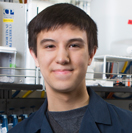 Brandon Lew wants to discover whether a person really can drink himself stupid.
Brandon Lew wants to discover whether a person really can drink himself stupid.
The science is more complex than you’d think, and to an undergraduate like Lew, a lot more fun.
“For me, I really like the lab meetings and talking about the research,” says Lew, a physics and integrative neuroscience major from Massapequa, N.Y. “I like the whole scientific process.”
The process isn’t just observation-hypothesis-test-analysis. The process is immersion in a laboratory’s culture. Lew was hooked when he talked with Pete Donovick, who sized the freshman up, and asked: “Can you cook?”
“Lab lunch is the highlight of my day,” says Donovick, a professor of psychology at Binghamton. “What I expect of freshmen is to think — not accept dogma.”
Lew loves the camaraderie, with putting up data to face the questions and the challenges of his mentors. Challenge assumptions. Second-guess conclusions. Find a new way.
“No idea is stupid,” Donovick says.
That attitude served Lew well during a summer-long stint at the Albert Einstein College of Medicine. “I got to experience what it’s like to be a full-time researcher,” Lew says. “And a lot of the techniques I learned can be used elsewhere.”
Elsewhere, as in Lisa Savage’s lab, and work understanding what alcohol does to the brain.
Lew is subjecting adolescent rats to “chronic intermittent ethanol treatment” — binge drinking. The observation: Brains exposed to that much alcohol have a smaller hippocampus and fewer neurons connecting brain cells. That’s the part of the brain that governs memory, so alcoholism really does damage learning.
“We kind of see that binge drinking is an adolescent thing,” Lew says. “We’re trying to see how it’s different in adolescents — if it’s different.”
The hypothesis is that adolescents can recover the ability to learn and create new neurons — for a time. After that, neurogenesis declines and the brain is permanently damaged.
Savage, a professor of psychology at Binghamton, says her lab is testing that idea now. It requires studying brains of actively alcoholic, formerly alcoholic and control rodents through adolescence and into adulthood.
Lew sees the applications; as a resident adviser, he counseled more than one friend after a binge.
“I can’t pinpoint that one moment where I got interested in the brain,” Lew says, citing Bill Nye, the Discovery Channel and supportive parents. But he’s committed to earning a Ph.D. and an M.D. and pursuing a career in research. “It’s going to be quite a journey.”







